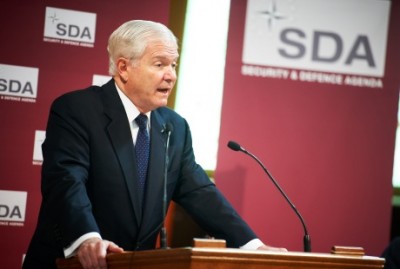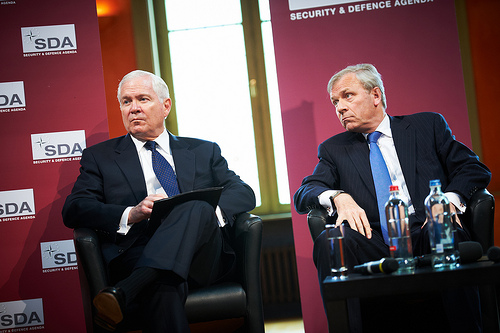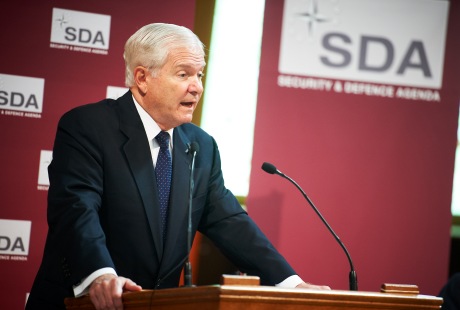Bob's last missile to Europe: no more Dolce vita at the expense of the US princess
 (B2) Robert Gates stayed a little longer than expected in Brussels after the meeting of NATO Defense Ministers. And some may have regretted this night more in the European capital.
(B2) Robert Gates stayed a little longer than expected in Brussels after the meeting of NATO Defense Ministers. And some may have regretted this night more in the European capital.
Many people's ears must have been ringing when Bob started talking to the SDA, the think tanks dedicated to defense and security issues, led by Giles Merritt. Leaving his post in a few weeks, after a long professional life, as director of the CIA under Bush I, secretary of defense under George Bush junior then Obama, Bob' did not bother with polite formulas and attacked ball in head, the United States a little bit, then NATO and above all the European allies, accused of playing the parasites, of dilettantism and of having the good life under the American security umbrella. Essential subject of his speech: Europeans wake up, the prodigal American uncle will be less generous in the future!
Strategic errors in Afghanistan among the Americans, among the Allies...
Robert Gates begins by acknowledging this obvious fact: the masterly error of the Americans in the first years in Afghanistan. " It's been no secret for a long time. The military effort in Afghanistan has suffered from a lack of focus, resources and attention, a situation exacerbated by the priority given by the United States to Iraq. "While among the allies, the " multitude of caveats that tied the hands of allied commanders, the inability of some allies to fulfill their contributions, or the widely disparate contributions of different member states” have generated many "frustration" and « megaphone diplomacy ».
But no premature withdrawal...: Arrived together, we will leave together
Despite everything, the members of the coalition have increased their efforts - from 20.000 they now represent 40.000 men. And, success seems within reach. Robert Gates therefore calls not to relax the effort and rush to the exit. While the American withdrawal is due to begin this summer, he estimates that most of the forces that arrived for the "surge" will remain in place. And ask the allies to do the same. " Too much has been accomplished, at far too much expense, to let the momentum slip away when the enemy is on the defensive. We cannot afford to see troop contributing countries withdraw their forces on their own agenda in a way that undermines the mission and increases the risks to other allies. And thus draw a roadmap: we arrived together, we will leave together. Which in English sounds (better) like a slogan: “ in together, out together ».
In Libya, incapable allies
It is reality. And Robert Gates develops it with forceful arguments. NATO - or rather the non-American NATO allies - is suffering today " significant gaps in capacity and political will ". Afghanistan demonstrated it, Libya proved it. In Afghanistan, while Europe has more than 2 million soldiers in uniform, " NATO has struggled, sometimes desperately, to sustain a deployment of 25 - 40.000 troops, not just on the ground but also in such crucial positions as transport aviation, intelligence, surveillance and reconnaissance, etc. ". In Libya, while there are " broad political support, that there are no ground troops under fire, that this affects a country neighboring Europe, and affects its vital interests”, it is even more “clear”. " The operation in Libya exposed serious NATO capability shortcomings and other institutional shortcomings. (...) Frankly - loose Bob — many of our allies have stepped aside not because they don't want to participate but simply because they can't. They just don't have the military capacity! »

An operations center operating at half capacity and allies running out of bombs
Everyone takes it for their rank. " The means of intelligence, surveillance and reconnaissance are lacking. The most advanced combat aircraft are little used because they cannot identify, treat and strike targets in an integrated campaign. NATO's air operations center in Italy needs target-spotting specialists, mostly from the United States - a providential arrival that will no longer be available in future emergencies. “We thus have the spectacle of an operations center which could manage more than 300 sorties per day and which can only deal with a maximum of 150 (!). ..." Moreover, after only 11 weeks of operations against a poorly armed regime in a sparsely populated country, several of our allies are running out of ammunition, calling on the US, once again, to make up the difference. »
Towards a two-speed NATO: good students and tourists
Robert Gates believes that his concern for a “two-speed NATO” is there today: “ between members who specialize in "soft", humanitarian, development, peacekeeping, and discussion and those who conduct "hard", combat missions; between those who are willing and able to pay the price and bear the burden of Alliance commitments, and those who enjoy the benefits of NATO membership - guarantees of security and tickets to the quarters - general - but do not want to share the risks and costs »
Of course, no one is quoted. But Robert Gates is transparent when he praises the effort made by certain countries such as Denmark, Norway (which carry out 1/3 of the strikes), Belgium or Canada... or those which devote more than 2% to their expenditure (France, United Kingdom, Greece and Albania). It is safe to say that the "tourists" are targeting countries like Germany, Italy, Spain, the Netherlands, Poland or Turkey.
The Tonton Us will cut off supplies to the European "Tanguy" if it does not take care of itself
Robert Gates does not fail to warn the Europeans. The Americans have reached their bearable maximum — today they participate in more than 75% of NATO's military expenditure compared to 50% during the Cold War —. And this maximum can only decrease in the future. Especially since the Europeans are not doing their part by reducing their budgets " less than 15% in the last decade "!
Fiscal pressure, looking towards Asia, change of generation...

On the one hand, the fiscal pressure is also at play in the United States. Choices must therefore be made in overseas commitments, particularly in terms of aid and armament support programmes, warns the Secretary of State for Defence. And, there is a certain lack of willingness and patience in Congress to spend increasingly valuable funds on nations that are apparently unwilling to devote the necessary resources or make the necessary changes to be serious and capable partners in their own defense ". On the other hand, the strategic attention of the United States is drawn to Asia in particular. " Defense commitments and investments will grow in the coming years on this continent. Finally, there is a phenomenon of generational change. " Future American political leaders - those for whom the Cold War does not have the same experience as it did for me - may consider the return on America's investment in NATO not worth the cost. »... In other words, the baby Europe, grown up, must learn to assume responsibility and leave the American family nest. And quick !
Robert Gates knows that the Europeans will not be able to reinvest massively in defense anytime soon. But he advises them at least to do it more intelligently than today. NATO member countries (excluding the USA) collectively spend $300 billion a year. " Judiciously and strategically allocated, they would acquire a significant amount of usable military capacity. » Member countries should consider « new approaches to building combat capabilities - in markets, training, logistics, support. NATO member states must do more to share (pool) military assets”. Incidentally, the Secretary of State for Defense shoots down "Smart Defense" initiatives which are not " not the panacea » and pleads that « nations are more accountable (and do) their fair share of common defense. ". A convinced European could not have said it better!
Le text of Robert Gates' speech (in English). The excerpts have been translated by me.
Read also: Bob's lesson, what should we learn from it?


All of this obviously also illustrates something else, linked to a fundamental divergence between each other on the objectives, in particular of NATO. This is indeed where the fundamental problem lies. The analysis that Europeans and Americans make of the situation is different, and many Europeans are in Afghanistan more to show solidarity with the Americans than out of a deep conviction of the usefulness of this mission. When the Americans politically impose a mission (and this has happened several times in the past), they should not be surprised that the allied nations vote with their feet and do not follow them in undertakings to which they do not see any major political and security interest. The Americans are expecting unconditional and complete support for their positions, but this expectation is unreasonable. On the other hand, we must not throw the baby out with the bathwater and conclude that NATO has no justification. It has a fundamental utility, but one must not ask of it more than it can give.
defense europe advocated by the americans, we will have seen it all! 🙂
unfortunately it is a little late, no more political courage anywhere, our elites too busy making the big difference between populism and ultra-liberalism...
indeed the new us leaders, led by Obama, are likely to be much less concerned about europe.
worrying for the future, when russia will again exert pressure with energy supplies and armed interventions in eastern europe
There's a lot to complain about Bob's little speech, because a lot of the accusations are unfounded
1) The USA contributes 25% (all inclusive 2010) to the financing of NATO (burden sharing). Bob said that this budget has increased by 75% since 1989 (“But some two decades after the collapse of the Berlin Wall, the US share of NATO defense spending has now risen to more than 75 percent – at a time when politically painful budget and benefit cuts are being considered at home.”). Big difference, participation is still 25% of the total. If not that the costs increase, it is valid for everyone. 75% increase in 20 years = 5% year. http://fpc.state.gov/documents/organization/142718.pdf (note that the entry of new members has reduces US costs)
Most of this money goes to finance the military and civil structures of NATO but also the AWACS, the pipeline etc… Of course if we include in the accounts the total military expenditure of the USA in relation to the GDP, the picture is different. But do France (and the UK) include the cost of their bases etc. in the northern hemisphere in the NATO budget? I doubt. Moreover the USA really needs Ramstein, Landsthul etc… for operations (including Iraq) which have little to do with the defense of Europe, have opened new bases in Eastern Europe etc. for purely national geostrategic motives and fitting all this into the “NATO budget” is really questionable.
Or we discuss the financing dedicated to NATO or the all-round (even accumulated) defense budgets of other countries, but we do not mix the two.
2) “difficulties in deploying 40 men”. As far as I know the average deployments of the EU (including non-NATO members) in OPEX or similar are around 000 men per year (a peak at 90) counting rotations. But most of these deployments, some of which are useful directly or indirectly to the USA, for example in Africa or Lebanon, are not under NATO mandate, but UN, EUFOR etc. So basically the soldiers are where they need to be, but not under NATO mandate. This explains why if the Europeans have 70 men in Kosovo (000) it may be a bit difficult to ask them to add 2000, unless there is a serious crisis. Moreover, countries like France and the UK have a global presence in their overseas bases and should they be asked to “abandon” them and go somewhere?
Besides, how many direct deployments under NATO mandate have we needed since 1989? Apart from the ISAF which at one time had 50% of the troops in Afghanistan? The Balkans yes, but as said previously the soldiers were there under other mandates. The US left Bosnia and Kosovo to the Euros on the ground (apart from a brief initial presence) for 15 years. Sorry Bob, but that doesn't hold water.
3) capability gaps. I would like to point out that part of the (institutional) responsibility lies with the USA, which is in charge of the “air command” for Libya. Moreover, it was the USA that went out of their way to get NATO to take charge of the operation. So Bob was unaware of the loopholes, but just discovered them? Implausible. Besides, what was NATO's effectiveness in the Kosovo air war with 3 times more resources and 75% US participation? With a US General in charge? Better not to remember, the best rate of successful strikes was obtained by the French SEM with 70%. Nevertheless, the Serbian army came out 80% intact despite cluster bombs, graphite bombs and depleted uranium (which are not used in Libya). Don't throw stones at a glass house.
Moreover Gates does not take into account many European specificities created by history. Europe is not a nation-state. Many of the members of NATO are “new countries” and 20 years ago vassals of the soviets, Portugal, Spain and even Greece were 40 years ago fascist and poor states. They started producing butter before the guns, can we blame them?. Then we can always blame Germany (the largest contributor to NATO after the USA), and often rightly so, given its wealth. But have we heard the US blaming Japan for not “doing its part” in Asia? Let's be serious: if the Japanese started building modern aircraft carriers again, heads would explode in Washington.